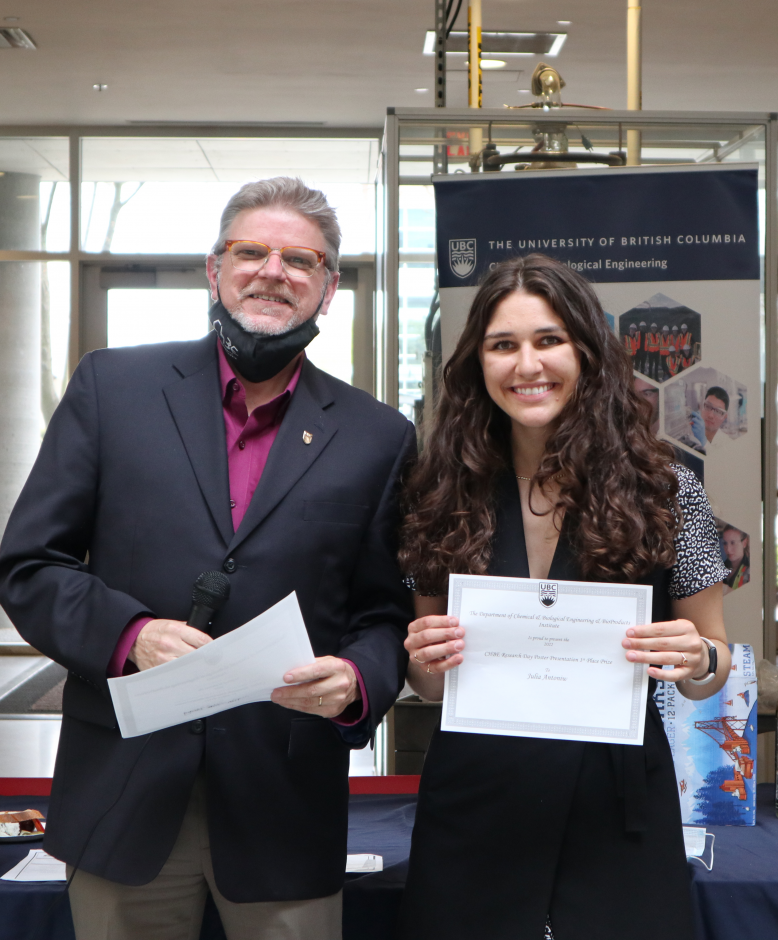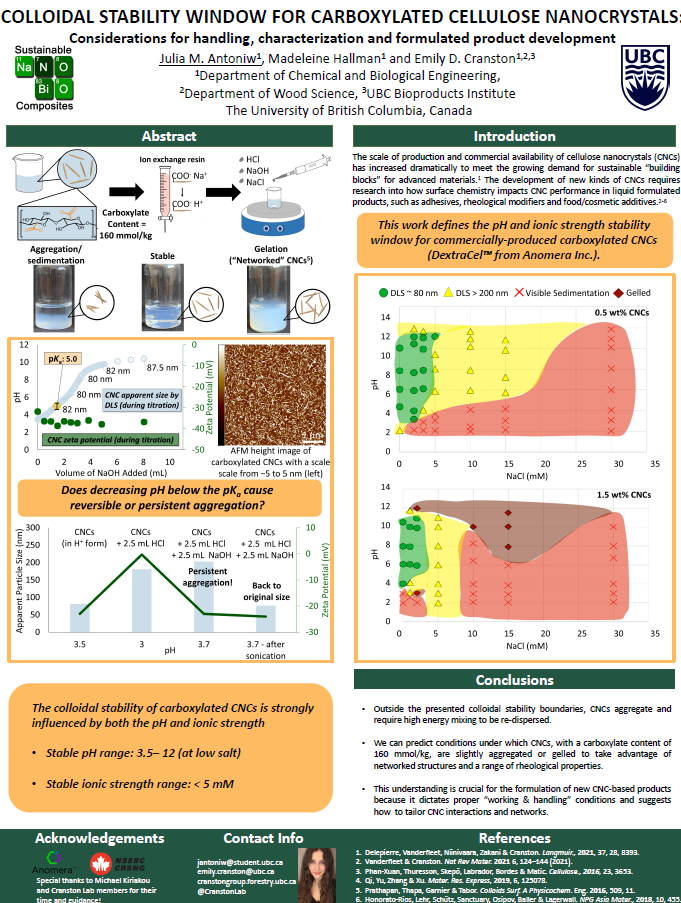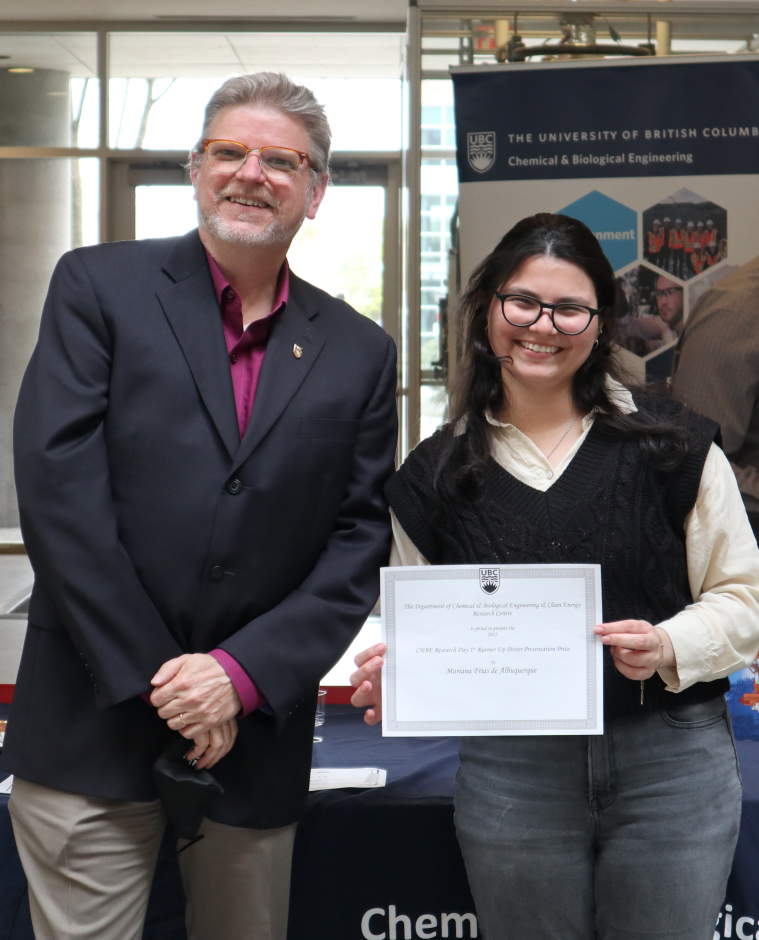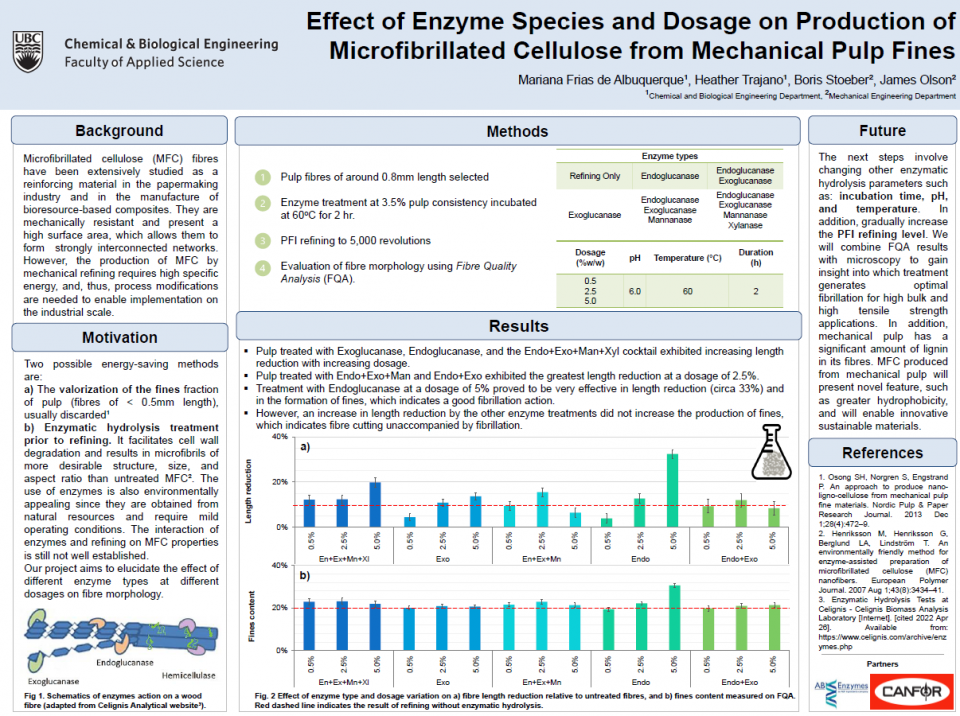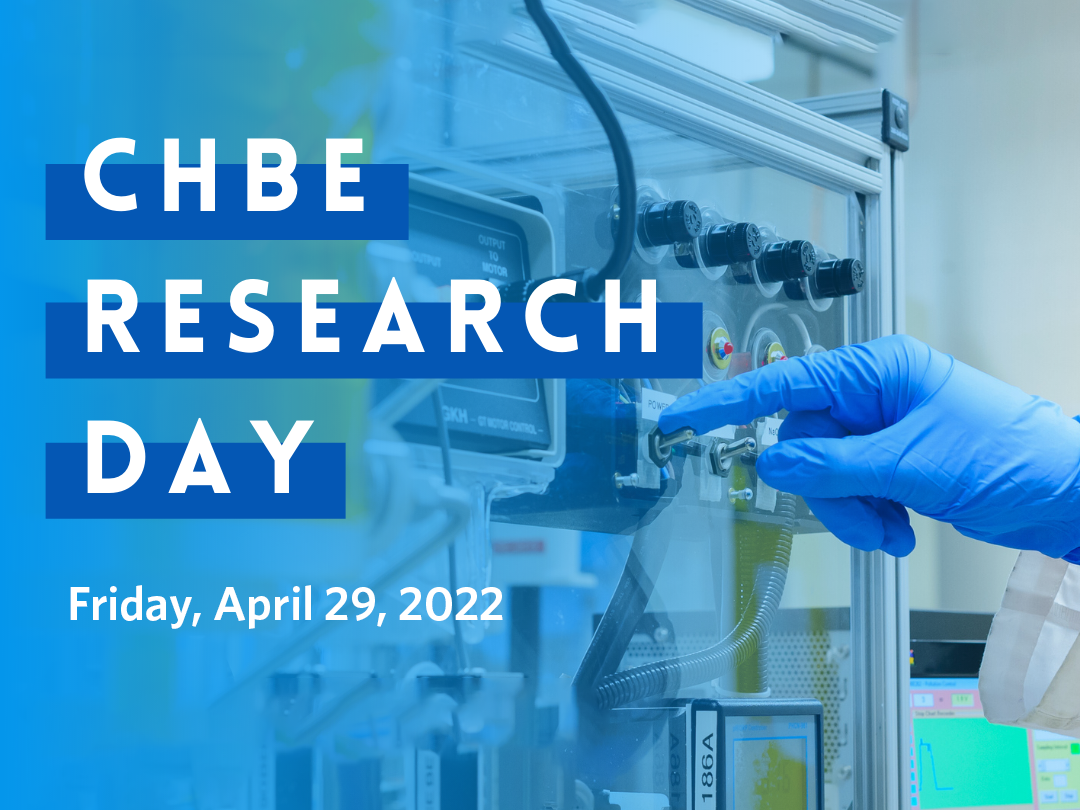
Thank you to everyone who participated in Research Day 2022.
Research Day is an event for sharing some of the latest scientific and technical contributions in the Chemical and Biological Engineering fields. The CHBE Department opens its doors to scientists, engineers, and industry partners to take part in the event, which includes posters and oral presentation competitions for graduate students as well as a poster presentation competition for postdoctoral fellows.
Results
Poster Presentation Winners
BPI Award for Top Poster Presentation
Student: Julia Antoniw
Title: Colloidal stability window for carboxylated cellulose nanocrystals: Considerations for handling, characterization and formulated product development
CERC Sponsored Award for 1st Runner Up Poster Presentation
Student: Mariana Frias de Albuquerque
Title: Effect of Enzyme Species and Dosage on Production of Microfibrillated Cellulose from Mechanical Pulp Fines
People’s Choice Award
Student: Alexandra Rousseau
Title: Electrochemical conversion of reactive carbon solutions into C2 products
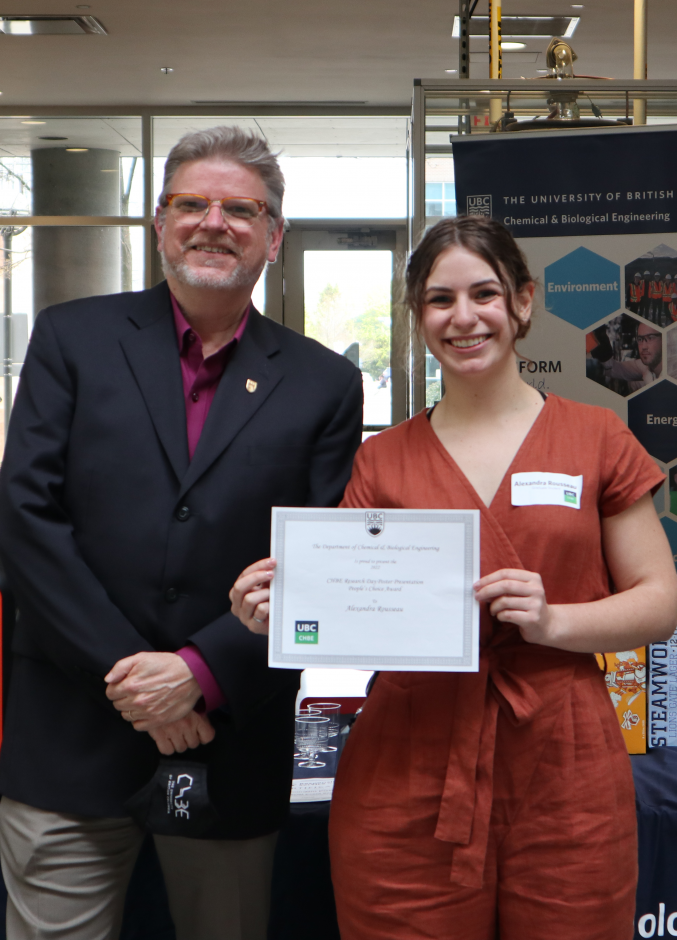
Poster coming soon
Oral Presentation Winners
1st Place Winner
Student: Yun-Han Huang
Title: Rheological Characterization of Neurosphere and the Effects of Oxidative Stress
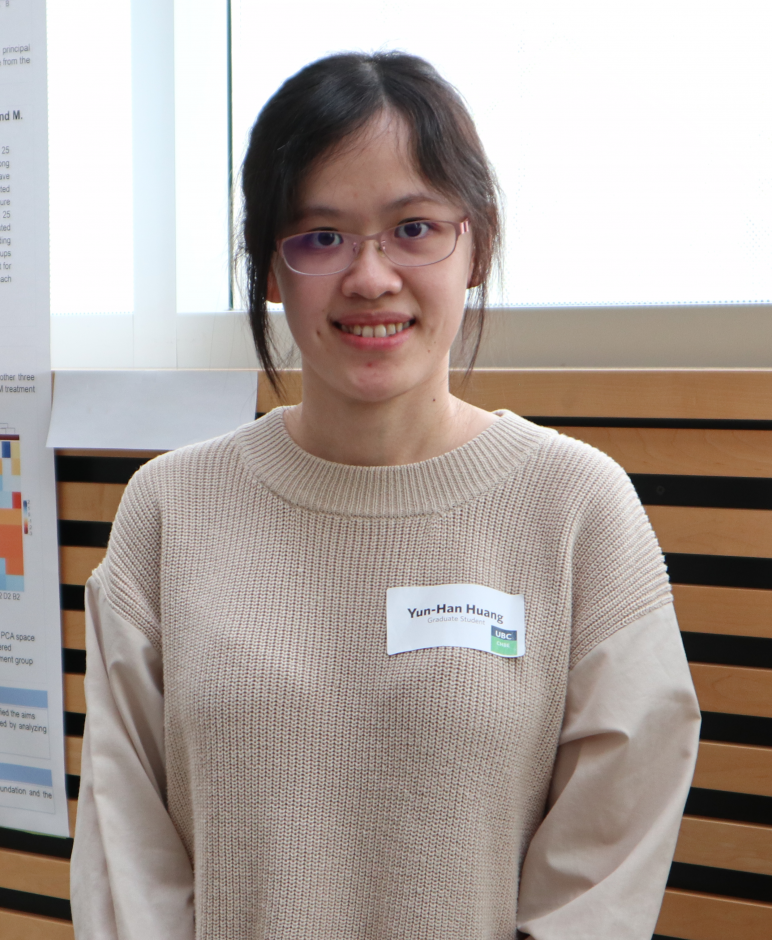
Abstract
Mechanical characterization of microparticles play important roles in various fields. For example, microcapsules in functional foods or drug delivery, micron-scale droplets or bubble in emulsion and foam products, and cells or tissues in the study of biomechanics. However, it has been difficult to carry out these type of characterizations when it comes to understanding the rheological properties, where dynamic measurements are involved. Furthermore, selecting suitable mathematical models for the interpretation of data can also be challenging.
Given the necessity and challenges of the studies, we have been studying the rheological properties of various types of microparticles, including gellan gum microcapsule, alginate hydrogel microbeads, and neurospheres. The characterization was carried out through a cantilevered-capillary force apparatus (CCFA). We performed step-wise measurements to monitor the material behaviors under equilibrium states or the relaxation curve, and frequency-sweep tests to obtain the complex moduli and explore any frequency-dependent behaviors.
For model selection, we have demonstrated that the Tatara contact theory can be utlized to describe the force-displacement relationship of core-shell microcapsules. We also proposed a simple model that allows the theory to account for geometrical factors, such as radius and shell thickness, of the microcapsules. The importance of model selection for viscoelastic characterization was also shown in the oscillation measurements of microcapsules and force relaxation test of neurospheres. We demonstrated that selecting an appropriate model can help revealing physics that were originally unknown. Finally, we demonstrate many factors that may appear to be trivial but can have great impacts on the characterization, such as backlash, irregular sample shapes, and surface tension.
Overall, our work shows that selecting the right models can help explore the right or new physics of materials, and there are many factors besides elasticity should be considered carefully in different systems. With our findings, we hope to yield insights for establishing experimental methods for mechanical characterization, and improve our understanding in the microparticle systems to facilitate studies in related fields.
People’s Choice Award
Student: Akash Gondaliya
Title: Synthesis and Characterization: Processing Bulk Natural Wood into Advanced Biobased Composite Material
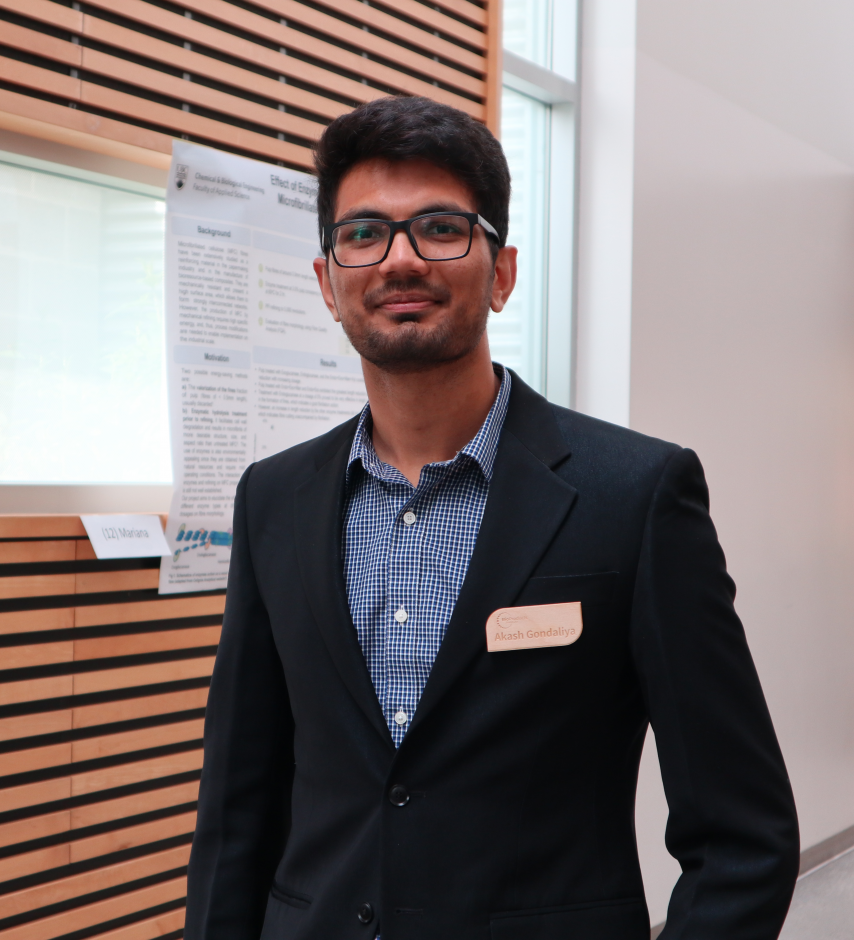
Abstract
To develop advanced wood bio-composite, an economical manufacturing strategy is showcased in this study. Cedar wood slabs were delignified and impregnated with a simple modifying precursor. The impregnated wood samples were densified with heat and pressure, turning the wood into a functionalized densified material. The modified material was confirmed by observing the nano and micro-structure with scanning electron microscope (SEM), seeing increased flexural properties such as modulus of rupture measured using an universal testing machine, and increased hydrophobicity using contact angle. SEM images showed wood lumens thickened and collapsed, with filled in sub-structure, leading to a compact multi-layered assembly. The functionalized densified material had better surface wear resistance and excellent mechanical performance (flexural strength was approximately 40% higher than that of original wood). The water absorption rate of the functionalized densified samples reduced significantly compared to the original wood which in turns enhanced the surface water repellency. This was due to the reduction of hydrophilic groups as well as clogging of the pores (pits) on the wood surface. Such enhanced performance makes the functionalized densified wood composite a promising candidate for advanced structural and engineering applications.
Schedule
10:30 a.m. – 11:30 a.m. Event Registration and Sign-up
11:30 a.m. – 11:45 a.m. Welcome and Opening Remarks
11:45 a.m. – 12:45 p.m. Poster Presentations & Lunch Break
1:00 p.m. – 2:00 p.m. Distinguished Speaker Seminar – Dr. Wilkinson (See abstract below)
2:00 p.m. – 2:15 p.m. Coffee Break
2:15 p.m. – 4:30 p.m. Oral Presentations
4:30 p.m. – 5:30 p.m. Reception and Award Announcement
Keynote Speaker: David P. Wilkinson
Future Energy: How climate change, sustainability, and geopolitical stability is transforming the path forward
Prof. David P. Wilkinson
Department of Chemical and Biological Engineering
University of British Columbia, Canada
Abstract
Energy is one of the most important challenges facing humanity today, forming a nexus with the environment, food, water, health, and global security and prosperity. Since the late 1700s and the start of the industrial revolution our dependence on fossil fuels has grown and resulted in significant climate change and global instability. Electrification of the energy system (targeting over 50% by 2050) and phasing out of fossil fuel use are cornerstones of the energy path forward. The use of batteries, fuel cells, biofuels and hydrogen, are critical to the success of this plan. The transition away from oil and gas is key but carbon capture, usage and storage (CCUS), and timing are important in the near-term to meet energy and climate change requirements, and for geopolitical stability. This talk will discuss the clean energy plan and transition based on the Net Zero 2050 Roadmap by the International Energy Agency (IEA) and others, some related research at UBC, and some of the potential issues we face in this massive undertaking.
Biography
David P. Wilkinson is a Tier 1 Canada Research Chair and Professor in the Department of Chemical and Biological Engineering at UBC. His research is focused on electrochemistry and electrochemical engineering, particularly with respect to materials, processes, and devices to create clean and sustainable energy and water. Prior to joining UBC he had over 20 years of industrial leadership positions in the areas of fuel cells, hydrogen and advanced lithium batteries. He has over 82 issued US patents and over 225 refereed journal articles, a co-authored book, and a number of book chapters and edited books. He has received a number of awards from various academic, scientific and industrial organizations, including the Order of Canada.
Research Day is sponsored by:

